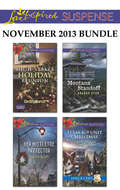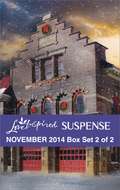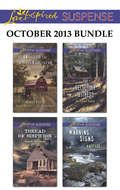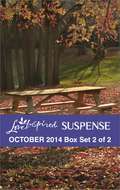- Table View
- List View
Love Inspired Suspense May 2024 - Box Set 1 of 2
by Lenora Worth Sharee Stover Darlene L. TurnerLove Inspired Suspense brings you three new titles! Enjoy these suspenseful romances of danger and faith.This box set includes: HER DUTY BOUND DEFENDER (A Mountain Country K-9 Unit novel)by Sharee StoverOnly seconds after widowed mother-to-be Naomi Carr-Cavanaugh is rescued from two masked gunmen, she&’s accused of multiple murders. Detective Bennett Ford believes he&’s finally apprehended the Rocky Mountain Killer—until Naomi is attacked again. Now she must rely on Bennett and his K-9 partner for protection. But with threats closing in, she&’ll have to prove her innocence first in order to stay alive…DISAPPEARANCE IN PINECRAFTby New York Times bestselling author Lenora WorthWhen Adina Maas arrives in Pinecraft to find her missing sister, she&’s blindsided by abductors who attempt to kidnap her. To her surprise, Nathan Kohr, a familiar face from her past, is there to save her. And it&’s clear that whatever trouble Adina&’s sister is in, Adina is now a target, too. But with Nathan&’s help, can they find out who&’s after the Maas sisters before Adina is the next to disappear?YUKON WILDERNESS EVIDENCE (A Crisis Rescue Team novel)by Darlene L. TurnerWhen skeletal remains are uncovered in the Yukon forest, forensic botanist Keeley Ash is called to the crime scene—and ends up abducted. She never expects her ex, paramedic Brett Ryerson, to come to her rescue, or her gathered evidence to be linked to a cold case. And when their son—whom Brett never knew existed—is kidnapped, they&’ll stop at nothing to save him and outrun the hunters determined to silence Keeley.For more stories filled with danger and romance, look for Love Inspired Suspense May 2024 Box Set – 2 of 2
Love Inspired Suspense May 2024 - Box Set 2 of 2
by Jodie Bailey Maggie K. Black Rhonda StarnesLove Inspired Suspense brings you three new titles! Enjoy these suspenseful romances of danger and faith.This box set includes: COLD CASE TRACKER (An Unsolved Case Files story)by USA TODAY bestselling author Maggie K. BlackK-9 officer Jackson Locke&’s sister has vanished—and the key to finding her lies with Amy Scout…his sister&’s best friend and his old crush. But when Amy comes under attack, two things become clear: Jackson&’s sister has been investigating cold cases and someone wants Amy dead. Now he must untangle the mystery between the cold cases and his sister&’s disappearance while guarding Amy from an enemy willing to kill to hide the truth…HIDDEN IN THE CANYONby USA TODAY bestselling author Jodie BaileyAfter Angie Garcia is attacked on her ranch near the Grand Canyon, uncovering the culprit becomes her biggest challenge. And she&’ll have to work with the last man she wants to see—Special Agent Lincoln Tucker—to investigate potential suspects. But with attacks escalating and a ranch hand missing, can they dig up the truth that links Angie to a perilous secret—and a ruthless killer—before it&’s too late?UNCOVERING COLORADO SECRETSby Rhonda StarnesWith her sister and brother-in-law murdered, it&’s up to bodyguard Adeline Scott to keep her twin nephews safe from a killer&’s crosshairs. So when an intruder breaks into their home and threatens them, she turns to her security expert boss, Linc Jameson, for help. But will they track down the answers as to what really happened before a killer strikes again?For more stories filled with danger and romance, look for Love Inspired Suspense May 2024 Box Set – 1 of 2
Love Inspired Suspense May 2025 - Box Set 1 of 2
by Kerry Johnson Jenna Night Sharee StoverLove Inspired Suspense brings you three new titles! Enjoy these suspenseful romances of danger and faith.This box set includes: DEADLY BADLANDS PURSUIT (A Dakota K-9 Unit novel)by Sharee StoverWhen Deputy US Marshal Gracie Fitzpatrick checks on a government witness, she unexpectedly walks into an ambush at Cameron Holmes&’s ranch. She and her K-9 partner, Bane, fight off the assailant—but to protect Cameron, they must escape into South Dakota&’s treacherous Badlands. Tracking dangerous enemies is what Gracie does, and Cameron&’s life in witness protection has left targets on his back. With a killer waiting in the shadows, Gracie and Cameron must work fast to uncover the truth about who wants him dead…if they want to stay alive.UNSOLVED MONTANA INVESTIGATION (A Big Sky First Responders novel)by Jenna NightWhen he rescues emergency dispatcher Clare Barlow from an armed assailant, sheriff&’s deputy Dylan Ruiz finds himself her new partner in her search to uncover her stepmother&’s killer. Digging into this cold case on her own has made Clare a target, and now she needs Dylan&’s help to solve the senseless murder—and keep her alive. Tracking down potential witnesses and evidence brings them closer to the truth, but can they evade an enemy determined to silence them both?HUNTED IN THE FOREST (A Forest Ranger Rescuers story)by Kerry JohnsonCaught in a hail of gunfire, FBI agent Eli Buchanan&’s only thought is to protect his five-year-old daughter. With no other option left, he turns to his ex-girlfriend, US Forest Service ranger Molly Calhoun, for help. Together, they flee into the Pennsylvania wilderness, but the cybercriminal targeting them is hot on their trail. As they navigate the dangers of the wild, Eli and Molly must put aside their past and team up to ensure Skylar&’s safety. Will they be able to outsmart their pursuer, or will they become his next victims?For more stories filled with danger and romance, look for Love Inspired Suspense May 2025 Box Set – 2 of 2
Love Inspired Suspense May 2025 - Box Set 2 of 2
by Lenora Worth Maggie K. Black Rhonda StarnesLove Inspired Suspense brings you three new titles! Enjoy these suspenseful romances of danger and faith.This box set includes: DANGEROUS ARSON TRAIL (An Unsolved Case Files story)by USA Today bestselling author Maggie K. BlackEmergency dispatcher Darcy Lane is abducted and left for dead in a burning house by a vengeful copycat of an arsonist she helped identify years ago. K-9 officer Lucas Harper, the man who once broke her heart, rescues her just in time. Staying one step ahead of a culprit proves nearly impossible, but Lucas will risk everything to keep Darcy safe. With the clock ticking, can they identify who&’s terrorizing her…before the cold-blooded killer&’s long-awaited revenge is complete?UNDERCOVER IN AMISH COUNTRYby New York Times bestselling author Lenora WorthAfter she helped put her criminal husband behind bars, Blythe Meissner thought she was safe—until she&’s nearly kidnapped. Now danger is following her every move and she&’s convinced the attacks are connected to her now-dead husband. Her best chance at survival lies with the former Amish man who rescued her once before, Detective Simon &“Simms&” Bueller. But when professional hit men track her to Florida, Blythe and Simms must go undercover to figure out who&’s behind the relentless threats. Can they expose a sinister agenda before deadly enemies close in?SMOKY MOUNTAIN ESCAPEby Rhonda StarnesSheriff Heath Dalton accidentally stumbles upon two gunmen trying to hide a body in the Smoky Mountains and barely escapes with his life. And when traveling nurse Kayla Eldridge finds herself stranded in the stormy wilderness with Heath, she now has a target on her back. They must work together to navigate the treacherous terrain and evade the criminals who are tracking their every move. Can they outrun their merciless hunters before they both lose their lives?For more stories filled with danger and romance, look for Love Inspired Suspense May 2025 Box Set – 1 of 2
Love Inspired Suspense November 2013 Bundle
by Laura Scott Sharon Dunn Christy BarrittLove Inspired Suspense brings you four new titles for one great price, available now for a limited time only from November 1 to November 30! Enjoy these contemporary heart-pounding tales of suspense, romance, hope and faith. This Love Inspired Suspense bundle includes High-Stakes Holiday Reunion by Christy Barritt, Her Mistletoe Protector by Laura Scott, Montana Standoff by Sharon Dunn and Texas K-9 Unit Christmas by Shirlee McCoy and Terri Reed.Look for four new inspirational suspense stories every month from Love Inspired Suspense!
Love Inspired Suspense November 2014 - Box Set 1 of 2
by Lenora Worth Rachelle Mccalla Sandra OrchardMore of the suspense you love-now Love Inspired Suspense brings you six new titles, in two convenient bundles! Enjoy these contemporary heart-pounding tales of suspense, romance, hope and faith. This Love Inspired Suspense bundle includes Deadly Holiday Reunion by NEW YORK TIMES bestselling author Lenora Worth, Twin Threat Christmas by Rachelle McCalla and Identity Withheld by Sandra Orchard. Look for six new inspirational suspense stories every month from Love Inspired Suspense!
Love Inspired Suspense November 2014 - Box Set 2 of 2
by Dana Mentink Kathleen Tailer Susan SleemanMore of the suspense you love-now Love Inspired Suspense brings you six new titles, in two convenient bundles! Enjoy these contemporary heart-pounding tales of suspense, romance, hope and faith. This Love Inspired Suspense bundle includes Hazardous Homecoming by Dana Mentink, Silent Night Standoff by Susan Sleeman and Perilous Refuge by Kathleen Tailer. Look for six new inspirational suspense stories every month from Love Inspired Suspense!
Love Inspired Suspense November 2021 - Box Set 1 of 2
by Dana Mentink Karen Kirst Jessica R. PatchLove Inspired Suspense brings you three new titles! Enjoy these suspenseful romances of danger and faith. This box set includes: YUKON JUSTICE (An Alaska K-9 Unit novel)By Dana MentinkWith her ruthless uncle sabotaging her family&’s reindeer ranch, K-9 team assistant Katie Kapowski heads home to help—and thrusts herself into the crosshairs. She needs assistance, even if it comes in the form of Alaska State Trooper Brayden Ford and his furry partner. But with their rocky past, can they work together…and survive? YULETIDE COLD CASE COVER-UP (A Cold Case Investigators novel)By Jessica R. PatchWhen her sister&’s remains are found, cold case agent Poppy Holliday is determined to solve the years-old murder. But someone&’s willing to kill Poppy and her partner, Rhett Wallace, to keep the truth hidden. And it&’s up to them to dig up the small town&’s deadly secrets…without becoming the next victims. SMOKY MOUNTAIN AMBUSH (A Smoky Mountain Defenders novel)By Karen KirstSomeone wants Lindsey Snow dead by Christmas—and she doesn&’t know why. The only person she can trust to help her is the man she betrayed, mounted police officer Silver Williams. But can they figure out who is trying to kill her…before the holidays turn lethal? For more stories filled with danger and romance, look for Love Inspired Suspense November 2021 Box Set – 2 of 2
Love Inspired Suspense November 2021 - Box Set 2 of 2
by Laura Scott Katy Lee Connie QueenLove Inspired Suspense brings you three new titles at a great value, available now! Enjoy these suspenseful romances of danger and faith. This box set includes: HIDING HIS HOLIDAY WITNESS (A Justice Seekers novel)By USA TODAY Bestselling Author Laura ScottA frantic call from a witness whose safe house is breached sends US marshal Slade Brooks to Robyn Lowry&’s side. But when he reaches her, she doesn&’t remember him—or the crime she witnessed. Now going off the grid until they figure out who leaked her location is the only way to keep her alive… HOLIDAY SUSPECT PURSUITBy Katy LeeAfter a murderer strikes, deputy Jett Butler and his search-and-rescue dog must work with the sole witness—FBI agent Nicole Harrington. But Nicole&’s the ex-fiancée he left behind after a car accident gave him amnesia years ago. And unlocking his past might be just as dangerous as facing the killer on their heels… TEXAS CHRISTMAS REVENGEBy Connie QueenEmergency dispatcher Brandi Callahan believes her missing sister&’s dead—until she answers a 911 call from her. When the cryptic call leads Brandi to a little boy just as bullets fly her way, she turns to her ex, Rhett Kincaid. But can the Texas Ranger shield Brandi and the child through Christmas? For more stories filled with danger and romance, look for Love Inspired Suspense November 2021 Box Set – 1 of 2
Love Inspired Suspense November 2022 - Box Set 1 of 2
by Lynette Eason Karen Kirst Jodie BaileyLove Inspired Suspense brings you three new titles! Enjoy these suspenseful romances of danger and faith. This box set includes: RESCUE MISSION (A Rocky Mountain K-9 Unit novel)by USA TODAY Bestselling Author Lynette EasonKate Montgomery thought coming to Montana would help her recover the lost memories she needs to find her friend&’s missing baby, but someone doesn&’t want her memoires to return. K-9 handler Lucas Hudson and his dog, Angel, must protect her from a killer who will stop at nothing to keep their secrets safe. BLOWN COVERby USA TODAY Bestselling Author Jodie BaileyWhile undercover investigating a suspected arms dealer, army special agent Makenzie Fuller blows her cover to save the life of her former partner, Ian Andrews. But he can&’t remember her or that he betrayed his country. Can he recover his memories in time to escape the killer&’s clutches alive? WITNESS PROTECTION BREACHby Karen KirstWhen his neighbor and her five-year-old son are attacked, mounted police officer Cruz Castillo is determined to keep them safe. But Jade Harris&’s escaped convict ex-boyfriend is set on getting his revenge—by abducting his own son. Will Cruz be able to see past Jade&’s secrets and protect her and her little boy? For more stories filled with danger and romance, look for Love Inspired Suspense November 2022 Box Set – 2 of 2
Love Inspired Suspense November 2022 - Box Set 2 of 2
by Debby Giusti Darlene L. Turner Connie QueenLove Inspired Suspense brings you three new titles! Enjoy these suspenseful romances of danger and faith. This box set includes: IN A SNIPER&’S CROSSHAIRSby USA TODAY Bestselling Author Debby GiustiAttacked in an attempted car theft, taxi driver Lily Hudson plunges down a gorge to flee her assailant—not knowing that she&’s become his new target. Amish widower Matthias Overholt comes to her rescue, but when clues suggest the attacker is tied to a local murder, saving Lily again might be more than he can handle… EXPLOSIVE CHRISTMAS SHOWDOWN (A Crisis Rescue Team novel)by Darlene L. TurnerCriminal investigative analyst Olive Wells must move quickly to catch a killer with an explosive agenda—because he&’s now after her and her foster child. Suspecting the hit on his ex-fiancée is personal, will police constable Zac Turner and K-9 Ziva uncover the bomber&’s identity before he claims more victims? ABDUCTION COLD CASEby Connie QueenFinding a mysterious file on her desk sends psychologist Kennedy Wells chasing down clues to solve a twenty-six-year-old kidnapping cold case—and straight into a violent assault. Texas Ranger Silas Boone safeguards Kennedy and agrees to help with the investigation, but the truth could prove deadly for them both… For more stories filled with danger and romance, look for Love Inspired Suspense November 2022 Box Set – 1 of 2
Love Inspired Suspense November 2023 - Box Set 1 of 2: Box Set 1 Of 2
by Dana Mentink Kathleen Tailer Rhonda StarnesLove Inspired Suspense brings you three new titles! Enjoy these suspenseful romances of danger and faith.This box set includes: SNOWBOUND ESCAPE (A Pacific Northwest K-9 Unit novel)by USA TODAY Bestselling Author Dana MentinkCrime tech Mara Gilmore is the only eyewitness to a murder, and the real killer is determined to silence Mara for good—and frame her for the crime. Now it&’s up to Officer Tanner Ford and his K-9 partner to protect Mara from a vicious assailant…and an unforgiving icy wilderness.ABDUCTED AT CHRISTMASby Rhonda StarnesHadley Logan went into hiding to safeguard her child—but suddenly her house is breached and she&’s attacked by an intruder. With Christmas approaching, can Hadley risk everything to accept the protection security specialist Ryan Vincent offers…as a deadly enemy closes in?MARKED TO DIEby Kathleen TailerAfter her young daughter is poisoned—along with others—investigative reporter Eleni Townsend wants answers…especially when an attempt on her life is made. Now with danger on her trail, can FBI agent Chris Springfield help Eleni evade hit men long enough to discover the truth of her past?For more stories filled with danger and romance, look for Love Inspired Suspense November 2023 Box Set – 2 of 2
Love Inspired Suspense November 2023 - Box Set 2 of 2
by Jessica R. Patch Sami A. Abrams Kari TrumboLove Inspired Suspense brings you three new titles! Enjoy these suspenseful romances of danger and faith.This box set includes: CRIME SCENE CONSPIRACY (A Texas Crime Scene Cleaners novel)by Jessica R. PatchA string of staged deaths forces Texas Ranger Emily O&’Connell on a covert mission to investigate a governor&’s connection to the deceased women. No one can know what she&’s doing—including former ranger Stone Spencer. But when Emily becomes the next target, she must choose between her secrets…and her life.KILLER CHRISTMAS EVIDENCE (A Deputies of Anderson County thriller)by Sami A. AbramsWhen Detective Kyle Howard rescues a woman from a burning house, he&’s shocked that it&’s Cassidy Bowman—the detective who was responsible for his fiancée&’s death. Now Cassidy can&’t remember who she is…or just how close she is to finding a merciless serial killer.DEADLY YELLOWSTONE SECRETSby Kari TrumboNaturalist Tamala Roth finds herself targeted by a poacher in Yellowstone National Park who will stop at nothing to keep his secret. The only person she can trust is Ranger Clint Jackson. But when a blizzard traps them, will they make it out alive?For more stories filled with danger and romance, look for Love Inspired Suspense November 2023 Box Set – 1 of 2
Love Inspired Suspense November 2024 - Box Set 1 of 2
by Terri Reed Jenna Night Deena AlexanderLove Inspired Suspense brings you three new titles! Enjoy these suspenseful romances of danger and faith.This box set includes: SEARCH AND DETECT (A Mountain Country K-9 Unit novel)by Terri ReedWhen single mother Zoe Jenkins and her baby are caught in an explosion that destroys her home, she&’s saved by FBI special agent Chase Rawlston and his K-9, Dash. But who set the bomb? Fearing that the notorious Rocky Mountain Killer he&’s been investigating has the mother and daughter in his sights, Chase takes them under his protection. But can he uncover the killer&’s identity before more innocent lives are caught in the crossfire?WITNESS PROTECTION AMBUSH (A Big Sky First Responders novel)by Jenna NightAfter eight years in witness protection, EMT Emma Hayes thought she and her family were safe in rural Montana…until their identities are compromised and she&’s nearly abducted. She&’s rescued by her coworker, paramedic Cole Webb, who vows to do whatever he can to protect her. Together, they must outrun the vicious criminals on their trail while searching for Emma&’s younger brother, who&’s put himself in the kidnappers&’ crosshairs as well. But when danger follows them to Cole&’s family ranch, their race to thwart the ruthless gang after them could be lethal.HUNTED FOR THE HOLIDAYSby Deena AlexanderWhen Shae Evans spots a familiar face at a Christmas pageant, she knows her witness-protection cover has been blown. Six years ago, her testimony put a crime boss away for life, but his vengeful son never stopped looking for her. Fleeing with her daughter, Shae accepts protection from former FBI agent Mason Payne—her child&’s secret father. Now they&’re only seconds ahead of the ruthless crime family who want Shae silenced forever. With threats everywhere, will they live to see the New Year?For more stories filled with danger and romance, look for Love Inspired Suspense November 2024 Box Set – 2 of 2
Love Inspired Suspense November 2024 - Box Set 2 of 2
by Valerie Hansen Alexis Morgan Carol J. PostLove Inspired Suspense brings you three new titles! Enjoy these suspenseful romances of danger and faith.This box set includes: UNDERCOVER ESCAPEby USA Today bestselling author Valerie HansenGoing undercover as a convicted killer is state trooper Rafe McDowell&’s best shot at shutting down a human trafficking ring. But when a surprise jailbreak ruins his plans and puts the prison&’s dog trainer, Hannah Lassiter, in danger, he must take her, her grandmother and their dog on the run from the mastermind behind the ring. With his fugitive target now after them, maintaining his cover is the only way to catch the criminal. But as the escalating attacks turn deadly, can he convince Hannah to trust him in order to keep them all alive?SNIFFING OUT JUSTICE (A Canine Defense novel)by Carol J. PostAfter witnessing her best friend&’s murder, Kristina Ashbaugh-Richards and her search and rescue dog, Bella, find themselves targeted by the killer. Kris can identify the criminal—and she&’s exactly what he looks for in his victims. Her high school crush, Detective Tony Sanderson, vows to protect Kris and her son, but as they try to outwit a dangerous murderer, no place is safe to hide. With her life at stake, Kris&’s only hope of survival is to catch the serial killer before he catches her.A LETHAL TRUTHby USA Today bestselling author Alexis MorganAubrey Sims escaped a serial killer, but she never stopped looking over her shoulder. And now her deepest fear is beginning again: the killer is back. He&’s begun playing a cat and mouse game with Aubrey, making her relive a nightmare that never really went away. Cold case detective Jonah Kelly—a man who has his own past failings to atone for—will do whatever it takes to protect Aubrey. But their wounded hearts are drawing them all too close just as the killer&’s noose tightens around them…For more stories filled with danger and romance, look for Love Inspired Suspense November 2024 Box Set – 1 of 2
Love Inspired Suspense October 2013 Bundle
by Marta Perry Kit Wilkinson Diane Burke Kathleen Tailer Susan Sleeman Katy LeeLove Inspired Suspense brings you four new titles for one great price, available now for a limited time only from November 1 to November 30! Enjoy these contemporary heart-pounding tales of suspense, romance, hope and faith. This Love Inspired Suspense bundle includes High-Stakes Holiday Reunion by Christy Barritt, Her Mistletoe Protector by Laura Scott, Montana Standoff by Sharon Dunn and Texas K-9 Unit Christmas by Shirlee McCoy and Terri Reed. Look for four new inspirational suspense stories every month from Love Inspired Suspense!
Love Inspired Suspense October 2013 Bundle
by Kathleen Tailer Susan Sleeman Katy LeeLove Inspired Suspense brings you four new titles for one great price, available now for a limited time only from October 1 to October 31! Enjoy these contemporary heart-pounding tales of suspense, romance, hope and faith. This Love Inspired Suspense bundle includes Danger in Amish Country by Marta Perry, Diane Burke and Kit Wilkinson, Thread of Suspicion by Susan Sleeman, The Reluctant Witness by Kathleen Tailer and Warning Signs by Katy Lee.Look for four new inspirational suspense stories every month from Love Inspired Suspense!
Love Inspired Suspense October 2013 Bundle
by Kathleen Tailer Susan Sleeman Katy LeeLove Inspired Suspense brings you four new titles for one great price, available now for a limited time only from October 1 to October 31! Enjoy these contemporary heart-pounding tales of suspense, romance, hope and faith. This Love Inspired Suspense bundle includes Danger in Amish Country by Marta Perry, Diane Burke and Kit Wilkinson, Thread of Suspicion by Susan Sleeman, The Reluctant Witness by Kathleen Tailer and Warning Signs by Katy Lee.Look for four new inspirational suspense stories every month from Love Inspired Suspense!
Love Inspired Suspense October 2013 Bundle
by Kathleen Tailer Susan Sleeman Katy LeeLove Inspired Suspense brings you four new titles for one great price, available now for a limited time only from October 1 to October 31! Enjoy these contemporary heart-pounding tales of suspense, romance, hope and faith. This Love Inspired Suspense bundle includes Danger in Amish Country by Marta Perry, Diane Burke and Kit Wilkinson, Thread of Suspicion by Susan Sleeman, The Reluctant Witness by Kathleen Tailer and Warning Signs by Katy Lee.Look for four new inspirational suspense stories every month from Love Inspired Suspense!
Love Inspired Suspense October 2014 - Box Set 1 of 2
by Debby Giusti Lynette Eason Sarah VarlandMore of the suspense you love-now Love Inspired Suspense brings you six new titles, in two convenient bundles! Enjoy these contemporary heart-pounding tales of suspense, romance, hope and faith. This Love Inspired Suspense bundle includes The Lawman Returns by Lynette Eason, Holiday Defenders by Debby Giusti, Susan Sleeman and Jodie Bailey and Tundra Threat by Sarah Varland. Look for six new inspirational suspense stories every month from Love Inspired Suspense!
Love Inspired Suspense October 2014 - Box Set 2 of 2
by Laura Scott Hope White Jane M. ChoateMore of the suspense you love-now Love Inspired Suspense brings you six new titles, in two convenient bundles! Enjoy these contemporary heart-pounding tales of suspense, romance, hope and faith. This Love Inspired Suspense bundle includes Down to the Wire by Laura Scott, Covert Christmas by Hope White and Keeping Watch by Jane M. Choate. Look for six new inspirational suspense stories every month from Love Inspired Suspense!
Love Inspired Suspense October 2014 Box Set 1 of 2
by Debby Giusti Lynette Eason Susan Sleeman Jodie Bailey Sarah VarlandLove Inspired Suspense October 2014 Box Set 1 of 2
Love Inspired Suspense October 2014 Box Set 2 of 2
by Laura Scott Hope White Jane M. ChoateLove Inspired Suspense October 2014 Box Set 2 of 2
Love Inspired Suspense October 2021 - Box Set 1 of 2
by Heather Woodhaven Dana R. Lynn Anne GalbraithLove Inspired Suspense brings you three new titles! Enjoy these suspenseful romances of danger and faith. This box set includes:ARCTIC WITNESS (An Alaska K-9 Unit novel)ByHeather WoodhavenWhen his ex-wife goes missing in the Alaskan wilderness after discovering a body, Alaska State Trooper Sean West and his K-9 partner, Grace, rescue her from a kidnapper. Now the murderer is on their trail, and it&’s up to Sean to protect Ivy and the little boy she plans to adopt. COVERT AMISH INVESTIGATION (An Amish Country Justice novel)By USA TODAY bestselling author Dana R. LynnPolice officer Kate Bontrager never planned to return to her Amish roots, but with a woman missing from witness protection in Kate&’s former community, she has no choice. The moment she arrives for her undercover assignment, she becomes a target…and working with her ex, Abram Burkholder, is her only hope of staying alive. KIDNAP THREATBy Anne GalbraithA mole in the police department thrusts a witness&’s mother right into a deadly gang&’s crosshairs. They&’ll kill anyone to keep Alice Benoit&’s son from testifying. Now it&’s up to officer Ben Parsons to protect Alice for twenty-four hours in a busy city…or a killer could go free.For more stories filled with danger and romance, look for Love Inspired Suspense October 2021 Box Set – 2 of 2
Love Inspired Suspense October 2021 - Box Set 2 of 2
by Lynette Eason Kerry Johnson Elizabeth GoddardLove Inspired Suspense brings you three new titles at a great value, available now! Enjoy these suspenseful romances of danger and faith.This box set includes: MOUNTAIN FUGITIVEBy Lynette EasonOut on a horseback ride, Dr. Kathrine Gilroy stumbles into the middle of a shoot-out. Now with US Marshal Dominic O&’Ryan injured and under her care, she&’s determined to help him find the fugitive who killed his partner…before they both end up dead. HIGH STAKES ESCAPE (A Mount Shasta Secrets novel)By USA TODAY Bestselling Author Elizabeth GoddardSomeone is killing off deputy US marshal Ben Bradley&’s witnesses one by one, and he won&’t let Chasey Cook become the next victim. But on the run with a leak in the Marshals Service and murderers drawing closer, he and Chasey have no one to trust. Can he shield her from danger on his own? SNOWSTORM SABOTAGEBy Kerry JohnsonAfter single mom Everly Raven finds her friend murdered inside a chalet on her family&’s ski resort, the blame falls on her. With a blizzard closing in and the killer&’s henchmen chasing her down a mountain, Everly must work with FBI agent Isaac Rhodes—the father of her secret child—to clear her name. For more stories filled with danger and romance, look for Love Inspired Suspense October 2021 Box Set – 1 of 2



















